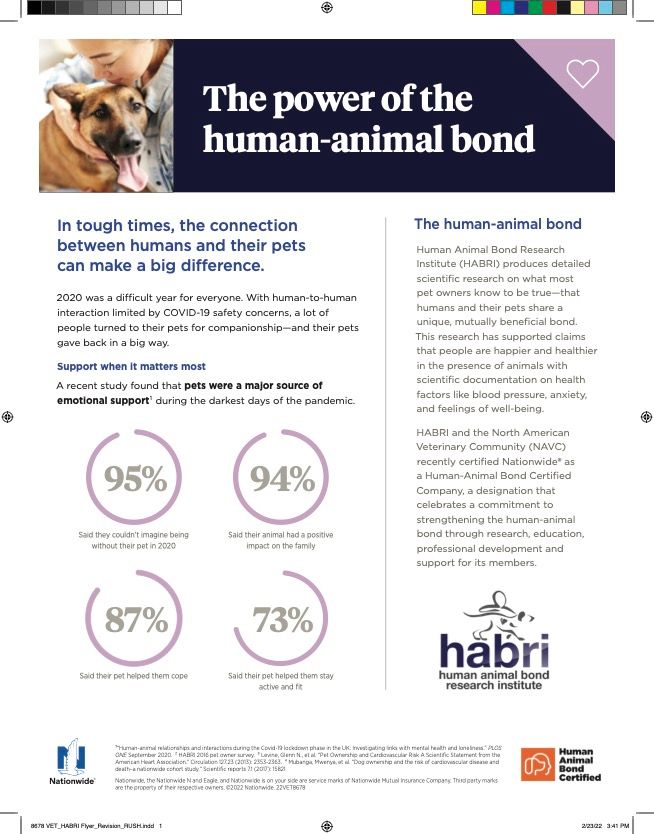
The power of the human-animal bond
In tough times, the connection between humans and their pets can make a big difference.
Content sponsored by Nationwide
2020 was a difficult year for everyone. With human-to-human interaction limited by COVID-19 safety concerns, a lot of people turned to their pets for companionship—and their pets gave back in a big way.
Support when it matters most
A recent study found that pets were a major source of emotional support1 during the darkest days of the pandemic.
The human-animal bond
Human Animal Bond Research Institute (HABRI) produces detailed scientific research on what most pet owners know to be true—that humans and their pets share a unique, mutually beneficial bond.
This research has supported claims that people are happier and healthier in the presence of animals with scientific documentation on health factors like blood pressure, anxiety, and feelings of well-being.
HABRI and the North American Veterinary Community (NAVC) recently certified Nationwide as a Human-Animal Bond Certified Company, a designation that celebrates a commitment to strengthening the human-animal bond through research, education, professional development and support for its members.
Talking with clients about the relationship between pets and human health can improve pet care.
If pets make our lives happier and healthier, should veterinarians participate in human health conversations, too?
Research suggests that veterinarians who contribute to conversations about the human-animal bond can improve their patients’ care. They also tend to create a stronger bond with their clients, who see the vet as a caregiver for the whole family.
Conversations that improve care
Pet owners are more likely to seek out veterinary and wellness care for pets when they understand how their bond with their pets impacts their own health.2
Be an advocate for the human-animal bond
Here are some helpful entry points to discussing this fascinating topic:
- Did you know that the American Heart Association believes that pet ownership improves heart health in humans?3
- Did you know that owning a cat can improve the odds of recovery following a heart attack?3
- Did you know that your pets can help lower your systolic blood pressure?3
- Did you know that dog owners tend to live longer than people who don’t have a dog?4
Interested in learning more? Register now for Nationwide's Human-Animal Bond Webinar series, "The Healing Power of Pets: Know and Share the Science."
References
- Ratschen E, Shoesmith E, Shahab L, et al. Human-animal relationships and interactions during the Covid-19 lockdown phase in the UK: Investigating links with mental health and loneliness. PLoS One. 2020;15(9):e0239397. Published 2020 Sep 25. doi:10.1371/journal.pone.0239397
- HABRI 2016 pet owner survey.
- Levine GN, Allen K, Braun LT, et al. Pet ownership and cardiovascular risk: a scientific statement from the American Heart Association. Circulation. 2013;127(23):2353-2363. doi:10.1161/CIR.0b013e31829201e1
- Mubanga M, Byberg L, Nowak C, et al. Dog ownership and the risk of cardiovascular disease and death - a nationwide cohort study. Sci Rep. 2017;7(1):15821. Published 2017 Nov 17. doi:10.1038/s41598-017-16118-6
Newsletter
From exam room tips to practice management insights, get trusted veterinary news delivered straight to your inbox—subscribe to dvm360.





